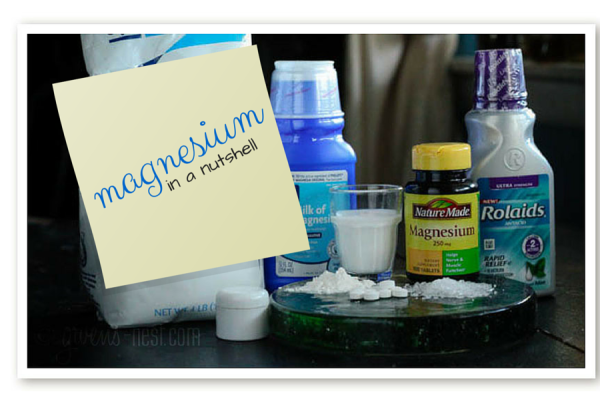
Magnesium has been on my radar for the past three years. I’ve been writing and researching on this important mineral quite a bit, including posting several DIY supplements that I use and love. Today I thought I’d hit the highlights of what I’ve learned about Magnesium
Importance Of Magnesium
Magnesium is essential to all life. It’s a key player in over 300 enzymatic actions in the human body, and plays an important part in every cell in our bodies. It also helps to regulate other minerals and compounds in the body like calcium, vitamin D, copper, potassium, and zinc. It’s critical to nerve, muscle, and heart health, and contributes to the energy production cycle in the body.
In short: it’s *very* important.
It’s also become less available in our food system, and current medical thought is that most people don’t get even the USRDA in their daily diets, much less amounts that address deficiency. Let’s talk about symptoms of deficiency:
Magnesium Deficiency Symptoms
Here’s a partial list:
- eye twitching
- irritability/anxiety
- lack of sleep or sleep disorders
- Restless Leg Syndrome (RLS)
- AFIB or abnormal heart rhythms
- confusion
- low blood pressure
- nausea & vomitting
- muscle spasms or cramping
- PMS or painful periods
- braxton hicks contractions
- weakness
- hyperventilation or “air hunger” (feeling like you can’t get a deep breath)
- insomnia
- poor nail growth
- seizures
- constipation
- photophobia (lights seem too bright or bother the eyes)
Now there can be multiple underlying issues that contribute to the above symptoms, but you can see trends in how important magnesium is to health!
Studies have found magnesium to be helpful in the treatment of fibromyaligia, type 2 diabetes/insulin resistance, arrhythmia and heart failure, high blood pressure, migraines, osteoporosis, pre-ecclampsia, PMS, RLS, depression, and asthma. Seriously. It’s good stuff! [source]
Things that Tank Magnesium Levels
Beyond just not having adequate levels in our foods, there are other things that can push us into having lower levels of magnesium. There are temporary and long term health conditions that disrupt the body’s magnesium metabolism including stomach bugs, intestinal diseases (like ulcerative colitis and IBS), hyperthyroid (high thyroid hormone levels), adrenal fatigue, and even many meds including diuretics can cause magnesium wasting or lowered levels.
Lifestyle choices can also lower our levels. Things like persistent stress, alcoholism, heavy sweating, overdoing caffeine or coffee or sodas can also create problems with our magnesium levels.
Is There A Test I Can Ask For?
The tricky thing with magnesium is that it does its work inside the cells and tissues. So a standard blood test is not going to give you a very good picture of your tissue levels. Looking at your symptoms sets as a whole is the best way to determine if you should try adding more magnesium into your diet. Your doctor or healthcare provider should be able to point out any risk factors, like medications, kidney disease, or even using larger amounts later in pregnancy. So please talk with your doctor if you’re already on meds or have health complications prior to starting to supplement. 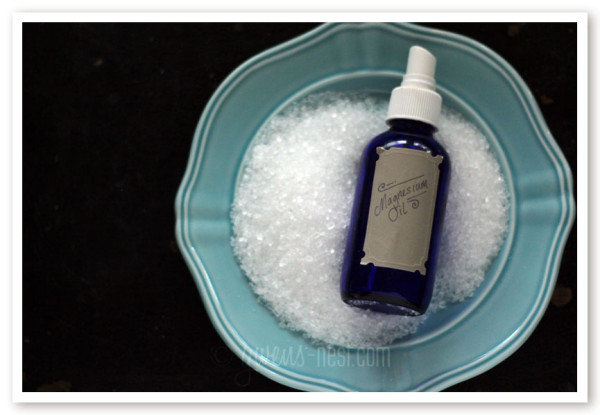
The Best Magnesium to Take
Magnesium is a needy mineral that’s always bonded to another element, and there are LOTS of forms. Would you believe that the most common magnesium supplements are a *very* poorly absorbed forms? They won’t do much toward helping tissue levels or deficiency.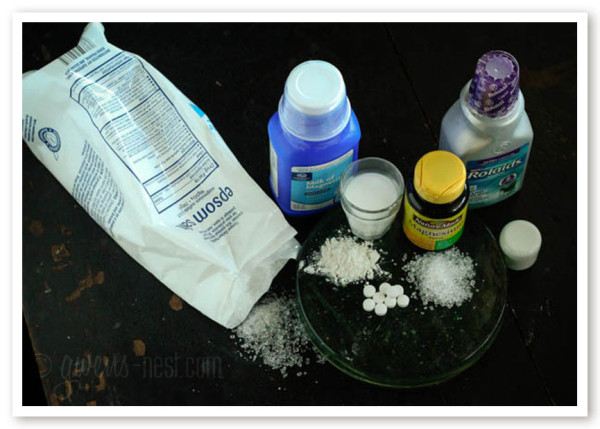
If you walk into any drug store and pick up the generic bottles of magnesium from the vitamin displays, you’re going to be getting a form that’s really best at moving your bowels. Which can be really handy if you’re constipated. If you want the full article on the Best Magnesium to Take, it’s here, along with a handy walled printable. But here’s the short version:
Magnesium Forms for Constipation
- Tablets: Magnesium Oxide or Magnesium Citrate
- Liquids: Prepared Magnesium Citrate, Magnesium Hydroxide (Milk of Magnesia) or prepared Magnesium Sulfate (Epsom Salts)
Magnesium Forms for Deficiency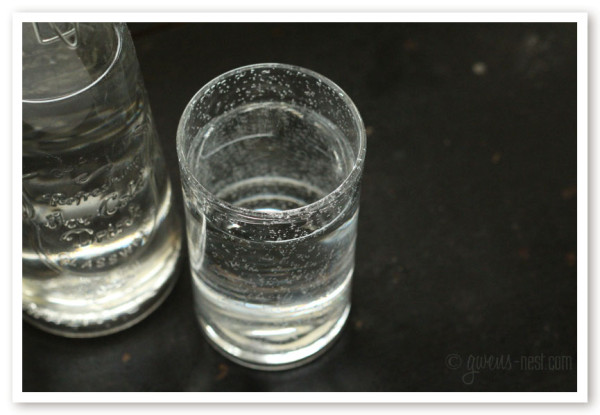
The rule of thumb is to go low and slow when beginning to supplement for deficiency (especially if you have sensitive bowels). Here are my favorite supplements:
- Magnesium Oil Spray– this recipe is SO easy to make and is perfect if you have a tricky tummy that can’t handle the internal forms yet. I also love it for the occasional muscle cramp or growing pain, as you can apply it topically right to the area.
- Magnesium Carbonate Drink– when I had a severe calcium disorder, this is the form of magnesium that worked best for me. I highly recommend it if you’re dealing with a serious deficiency.
- Alkaline Water– This is a fantastic, gentle and EASY recipe to get a little extra boost of magnesium in your daily drinking water. And it tastes great- like good quality mineral water.
- Albion Chelated Mag Glycine– (Amazon affiliate link) is a great choice for addressing deficiency if you prefer pills or capsules. Magnesium Taurate, Mag Lactate, and Mag Chloride are also good choices. Mag chloride is especially well suited if you have low stomach acid.
Foods High in Magnesium
My favorite way to support healthy magnesium levels is healthy whole foods. 
Dark leafy greens, whole grains like oats, beans, nuts, and fish are all great sources of natural magnesium. And another cool thing- I learned that you can add epsom salts as a soil additive to help replenish your garden soil and harvest with healthy magnesium levels.
You can read more about magnesium levels in foods here.
Other Uses for Magnesium
I also discovered some fun beauty tips for using plain Milk of Magnesia. Did you know it’s a completely natural and *cheap* form of deodorant? Just be sure you’re getting plain magnesium hydroxide in water with no tricky additives. To read more Beauty tips with Milk of Magnesia, go here.
So there you go: everything I know about Magnesium in under 1,000 words.
Thanks for pinning and sharing to spread the word about this amazing mineral supplement!
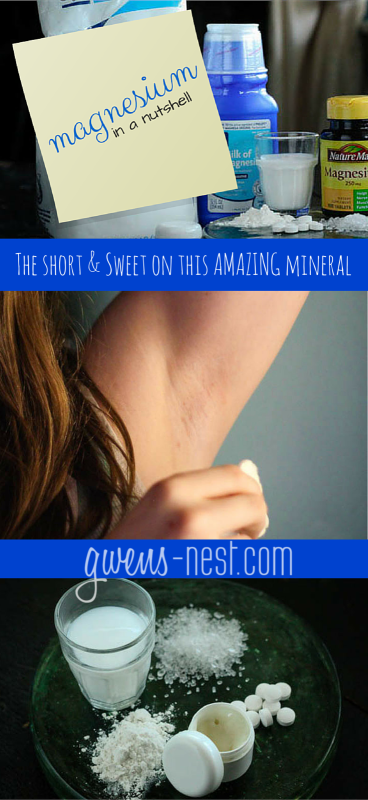
Thank you Gwen!!! Love learning more about being healthy. What is the difference between the Alkaline water and the magnesium carbonate drink? Is it just the proportion taken in? Thank you for all you do and sharing!!!
The difference is just in the quantity of magnesium. The Mag carb is more along the line of supplement levels, and it’s not super tasty. The alkaline water is more like a mineral water and tastes really good and clean. 🙂
i’m confused. The Mag carb uses less MOM than the alkaline water. So, are you drinking the mag carb straight vs just adding it to water with the alkaline water. Sorry….still having trouble understanding the difference…
The magnesium carbonate recipe is a magnesium supplement that I took when I needed high doses of mag, due to a health issue. The Alkaline water is a *concentrate*, so even though you use more MOM initially in the mix, you are only adding in a small amount of the concentrate to a gallon of water. It’s really a better way to add in magnesium on a daily basis, and is for those who just want to experiment with alkaline water, or enjoy a nice mineral flavor to their water, and who want low maintenance levels of mag daily.